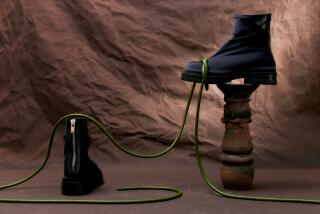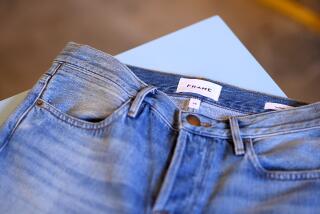In China, alpha males carry designer purses
Reporting from Beijing — Tiger Zhang browsed the sweaters at the Hugo Boss boutique at the upscale Oriental Plaza mall looking for fashionable additions to his wardrobe.
The 41-year-old investor was dressed in the unofficial uniform of Chinese businessmen: dark blazer, crisp white shirt, designer slacks, silky tan socks, hand-tooled loafers — and an expensive purse.
Lest anyone think the $500 Dunhill clutch with dual bronze zippers belonged to his wife, he proudly explained how his business cards, cash and two cellphones fit neatly into its buttery leather interior.
“It’s crucial for business,” said Zhang, who chose the chocolate-colored bag because he thought it was stylish without being flashy. “It shows I have good taste.”
That’s debatable, considering Zhang wore his hair in a cotton candy pouf. What’s clear is that the designer handbag, long a fashion staple for stylish women worldwide, has become a status symbol for upwardly mobile men in China.
At business meetings and social events across China these days, many of the Prada, Louis Vuitton and Burberry bags are being toted by the fellows in the crowd.
Wang Zhongzhu, a 42-year-old insurance executive, wouldn’t dream of networking without his $1,000 leather Dunhill slung over his shoulder. He said the creamy brown mini-messenger bag sends a message that he appreciates — and can afford — fine accessories.
“It’s a way of representing where you stand,” Wang said. “It makes people think you could potentially work for a big company.”
Designed for men, many of these guy purses often known as shou bao in Mandarin would be right at home in the women’s handbag section of an upscale department store. Popular styles include the oversize wallet with wraparound zippers like Zhang’s and the embossed leather Coach handbag with the slinky shoulder strap and handles. Colors trend toward solid brown, black and gray. But some fashion-forward gents don’t mind showing a little flash: Burberry plaid, Gucci’s interlocking GG pattern or Louis Vuitton’s distinct LV monogram.
Luxury leather goods makers can’t believe their luck: Both sexes in the world’s most populous country adore purses.
Men represent 45% of the $1.2-billion market for all luxury handbags in China, according to Victor Luis, president of Coach Retail International. That figure is just 7% in the U.S.
“China is a fantastic opportunity,” Luis said. “There’s a confidence and comfort in Chinese men utilizing bags in the same manner as women do.”
How China’s often gruff, male-dominated business culture developed a taste for purses owes a little to history, necessity — and vanity.
The country’s economic awakening 30 years ago launched an entrepreneurial class bent on dressing for success. Mao tunics quickly gave way to Western suits, but Wall Street-style briefcases never really caught on.
Enter the fat wallet problem. China is now the world’s No. 2 economy, but it still runs largely on cash. The largest paper bill, the 100-yuan note, is worth only about $15. So even modest debts can require businesspeople to carry thick wads of cash that could choke a traditional billfold.
The proliferation of smart phones and other electronic gadgets in recent years found men running out of pockets to put them in. In a nation where most people still use public transportation to get around, commuters need to keep their hands free to hang from a subway strap or bus pole.
Super-size wallets, handled clutches and strapped bags turned out to be not only useful, but also a way to display rising affluence. Any common laborer can afford a cheap nylon satchel. Designer accessories that are expensive and streamlined, with European flair, are viewed here as the trappings of the successful Chinese alpha male.
“For Chinese, it’s a show of masculinity,” said Zhang Lianhai, a 33-year-old marketing strategist gripping a plain, black leather Prada handbag outside a Gucci store in Beijing. “We need luxury brands. You won’t be taken seriously if you look too casual.”
Indeed, pricey handbags — power purses, if you will — are often wielded for maximum effect, said Paul French, a Shanghai-based author and chief representative of the market research group Access Asia. The retail analyst said he was struck by the way many first-generation Chinese entrepreneurs used these props, leaving them unzipped just enough to whip out a gold lighter or reveal a brick of 100-yuan notes.
“They’re a tribe like any other.... They needed to be able to recognize each other across the banquet table,” French said. “They’re the guys that built modern China.”
These men are also boosting the fortunes of luxury retailers such as Hermes International. The Paris leather goods fashion house saw its Asian sales jump 38% last year, thanks largely to expansions in mainland China, Macao and Hong Kong.
After saturating the likes of Beijing and Shanghai, high-end retailers are moving to the hinterlands, where many have grown rich off mining and property booms. Hermes opened an outlet last year in the frosty northeast city of Harbin. A Louis Vuitton store is doing brisk business in the coal town of Taiyuan.
Prada is said to be nearing a listing on the Hong Kong stock exchange. The Italian fashion house held a runway show in Beijing last month, its first outside Europe.
Coach, the 70-year-old New York handbag maker, plans to open about a dozen locations in China by midyear, which would give it 53 stores in the country. The firm is looking to triple its China sales to $500 million within three years.
Small wonder that analysts project China to leapfrog the U.S. and Japan to become the world’s top buyer of luxury goods by 2015.
Companies are already retooling their marketing efforts to reflect the purchasing clout of Chinese men. In Louis Vuitton’s new ad campaign, Taiwanese-Canadian model Godfrey Gao carries a slender checkered bag with its strap slung across his body.
It’s exactly the kind of bag Yang Jun aspires to own. The 20-year-old office clerk at a Beijing cosmetics manufacturer knows it could set him back more than $1,000. He’ll have to save for months. But he said it would be money well spent.
“As a man, you must have one of those bags,” he said. “It will bring you status, dignity and boost your image.”
In the meantime, Yang makes do with a $45 knock-off Louis Vuitton. Despite its provenance, he said his superiors at work told him the strappy number was a handsome accessory. They should know: They all carry the real thing.
“It gave me more confidence immediately,” Yang said of his trusty bag. “But I have no doubt I will buy a real one sometime in the future.”
Nicole Liu in The Times’ Beijing Bureau contributed to this report.
More to Read
Inside the business of entertainment
The Wide Shot brings you news, analysis and insights on everything from streaming wars to production — and what it all means for the future.
You may occasionally receive promotional content from the Los Angeles Times.











